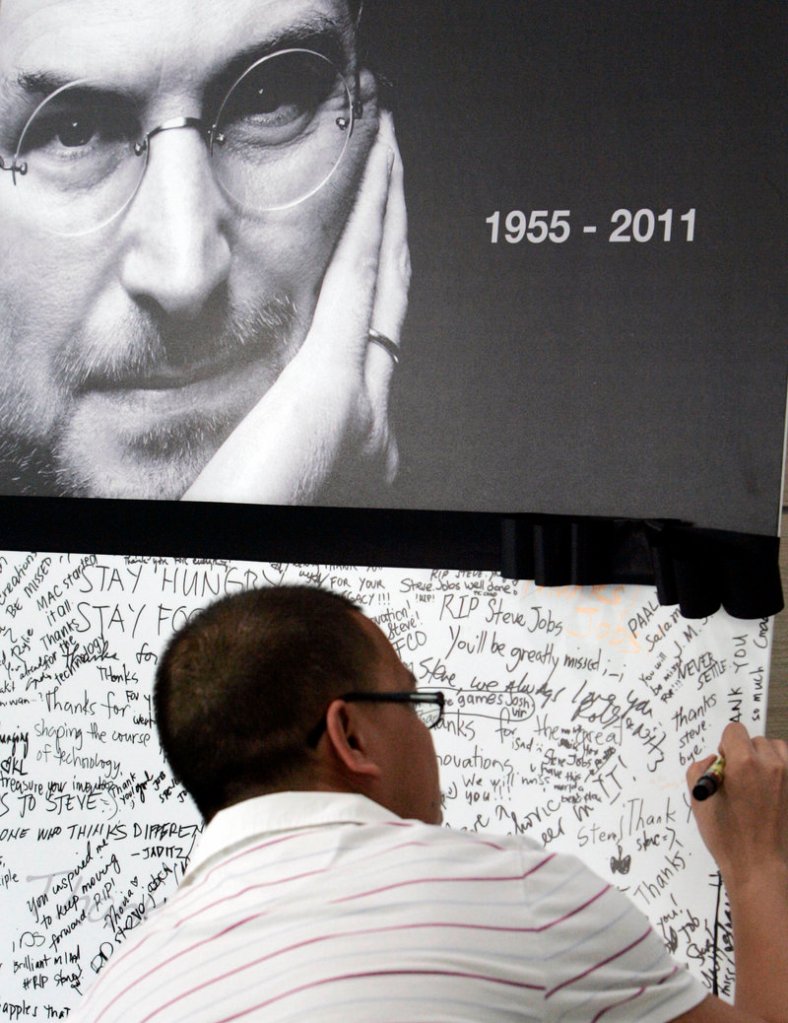“We only said goodbye with words.”
From “Back to Black” by Amy Winehouse
Virtually every reference to Bill Gates is prefaced by the phrase, “world’s richest man.” For Steve Jobs, in contrast, his personal wealth — which certainly must have been enormous — was never mentioned.
His importance and involvement in the lives of so many people transcended even our envious and resentful attitude toward those who have piles of money.
Depending on the daily ups and downs of the stock market, Apple is the largest or second- largest corporation in the world. But ask those occupying parks in protest of “corporate greed” to make lists of the greedy, and Jobs is unlikely to appear on one in a thousand.
Gates and Rupert Murdoch need to keep a watchful eye for clowns with cream pies when they appear in public. Steve Jobs never did.
Similarly, Gates, Warren Buffett, Ted Turner and lesser- known billionaires — following in the tradition of Andrew Carnegie — have added to their celebrity by turning large swaths of their personal fortunes over to nonprofit foundations to, as the saying goes, “give back to society.” Buffett has even added his voice to those calling for higher taxes on millionaires and billionaires by raising his eyebrows over the relative rates he and his secretary pay in income taxes.
But not Jobs.
Whatever his charitable giving and his income tax rate may have been, they were his business. And only the most insufferably self-righteous among us held that against him.
The reason, of course, for this deferential treatment was the source of the wealth.
It’s easy to resent Gates’ wealth because no one could possibly love using a Microsoft product. We all wrestle with the clunky, buggy, insecure, virus-laden pastiche of unrelated and infuriatingly frustrating programs only because everyone else does too.
For decades, Windows was, if not the only game in town, certainly the dominant game. If you wanted to use a PC and get a document to someone else, you had to go through Gates.
During the past 15 years, Jobs and Apple have changed all that. People don’t just use Apple devices; they love them. Indeed, prior to their introductions, it would have been impossible to say exactly just what were the intended uses of Apple’s devices. They were like large cardboard boxes in the hands of 4-year-old children — their uses were divined by the imaginations of their users.
A new word and an entire industry — creating apps — sprung up to fill the voids in the lives of those with iMacs, iPods, iPhones and iPads.
Steve Jobs proved the folly both of focus groups and the conspiracy theorists who believe that consumer demand is purely the creation of clever, manipulative advertising agencies. He created “insanely great” products that people didn’t know they needed until they saw them.
A college dropout who studied calligraphy while couch surfing through the rooms of friends still officially enrolled, Jobs made a career, multiple businesses and a vast fortune doing what he loved.
The notion that greed had anything to do with it is laughable. And so is the idea that he has or ought to “give something back to society.”
Society loved what he gave through his businesses. What’s the logic of saying he could do something more or something better by giving away his money?
And therein lies Jobs’ real legacy. And in that legacy is a message for those of us striving to find a way to do what we love in a place that we love. Supply does create its own demand. If we build it, they will come.
Finding and doing — really finding and really doing — what we love is a very hard, often unsuccessful and never-ending process that requires courage and perseverance. And, perhaps most importantly, doing what we love is the most valuable thing we can possibly give back to our brothers and sisters, our neighbors and co-workers and our children and grandchildren.
Charles Lawton is senior economist for Planning Decisions, a public policy research firm. He can be reached at: clawton@maine.rr.com
Send questions/comments to the editors.



Success. Please wait for the page to reload. If the page does not reload within 5 seconds, please refresh the page.
Enter your email and password to access comments.
Hi, to comment on stories you must . This profile is in addition to your subscription and website login.
Already have a commenting profile? .
Invalid username/password.
Please check your email to confirm and complete your registration.
Only subscribers are eligible to post comments. Please subscribe or login first for digital access. Here’s why.
Use the form below to reset your password. When you've submitted your account email, we will send an email with a reset code.